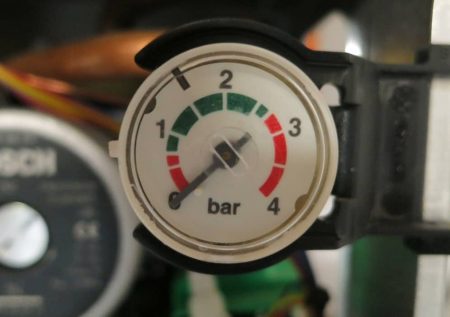
This happens on poorly maintained sealed central heating systems.
First of all, let me explain what a sealed system is, as this will give you a better understanding of why your boiler keeps losing pressure.
A sealed system is a central heating system that requires filling direct from your cold water main via a filling link, rather than being fed by a storage/header tank in the loft, that is what we call an open vent system. A sealed system has to be filled manually via the filling link to around 1.5bar when it’s cold, but always check your boilers manufacturer’s instructions first. All combi boilers and system boilers are sealed systems. For more information on different systems, Click Here
Once the system has been filled to 1.5bar any water which then escapes will cause the pressure in the system to drop, once the pressure drops to around 0.5bar (depending what boiler you have installed in your property) a safety switch will be activated and will prevent the boiler from firing up, leaving you with no central heating or hot water.
The main reasons your boiler will be losing pressure are:
You will need to have a look and inspect your central heating pipe work, paying particular attention to radiator valves and under the boiler itself. I would do this with the heating off first and just run your hands to feel any traces of water (even the smallest leak will cause the pressure to drop). Then try it with the central heating on as the leak may only occur while the system is hot but be mindful as the pipes will be hot!! I would recommend you put some gloves on and use some dry tissue as this will soak up any water straight away.
Once the leak has been identified then you can get it fixed, you can either do it yourself or Click Here to arrange an appointment. Just remember if you are doing it yourself and drain the system down then add some inhibitor before re filling the system.
As the water in your system is heated it expands, and that expansion needs to go somewhere, so your expansion vessel allows for that expansion. The expansion vessel itself is a rubber typed balloon that is full of air which is pre-charged to 1bar. It is normal for this to lose its charge over time. This should be checked and re-charged, if needed, on an annual boiler service.
When the expansion vessel loses its charge it is no longer capable of taking the expansion from the central heating system as the water is heated, what will happen then is the system pressure will increase and once the pressure gets to 3bar the PRV (Pressure Relief Valve) inside the boiler will be activated and discharge water until the pressure drops down to a safe limit, as the system then cools the pressure will drop and eventually will drop down to 0.5bar and the boiler will not fire up. One way to check this is to check the PRV pipe that comes out of your boiler and goes outside, it is usually a 15mm copper pipe which is elbowed back to the wall. If you ever see water dripping from this pipe the you have an issue and will need a qualified Gas Safe engineer to come and fix the problem.
If this issue is not sorted the balloon inside the expansion could split/break causing a costly repair.
As written above once the PRV (Pressure Relief Valve) inside the boiler is activated it may not go back on to its seating properly to create a water tight seal. This is very common in systems that contain a lot of sludge/containments as they can block the valve from its seating causing water to pass through it and out through the PRV pipe.
If your system is still losing pressure and all of the above have been investigated and not fixed the problem then the heat exchanger will need to be looked at, particularly if it is a condensing boiler. What can happen is the heat exchanger maybe leaking and going down the condense pipe, which would not be seen. The way to test this is to pressurise your boiler to 2bar and isolate the boiler from the central heating system, then dis-connect the condense pipe from the boiler and drop it into an empty bucket. If the pressure then drops inside the boiler and you are getting dirty water dripping through the condense pipe into the empty bucket then the heat exchanger is leaking. This should not be attempted by a homeowner and only use a qualified Gas Safe engineer. This will be a very costly repair and most of the time a boiler replacement will be needed as it will not be cost effective for it to be repaired.
So, these are the reasons why your boiler is losing its pressure.
If you would like more information or looking for a new boiler replacement then Get in Touch Today
You can now spread the cost of a new boiler with our Flexible Payment Options, for more information Click Here

Matt Hughes is the Managing Director of Platinum Boiler Installations and his mission is to make boiler installations as simple and hassle-free for customers as possible. What Matt doesn't know about boilers simply isn't worth knowing! Connect with Matt Hughes on LinkedIn >>